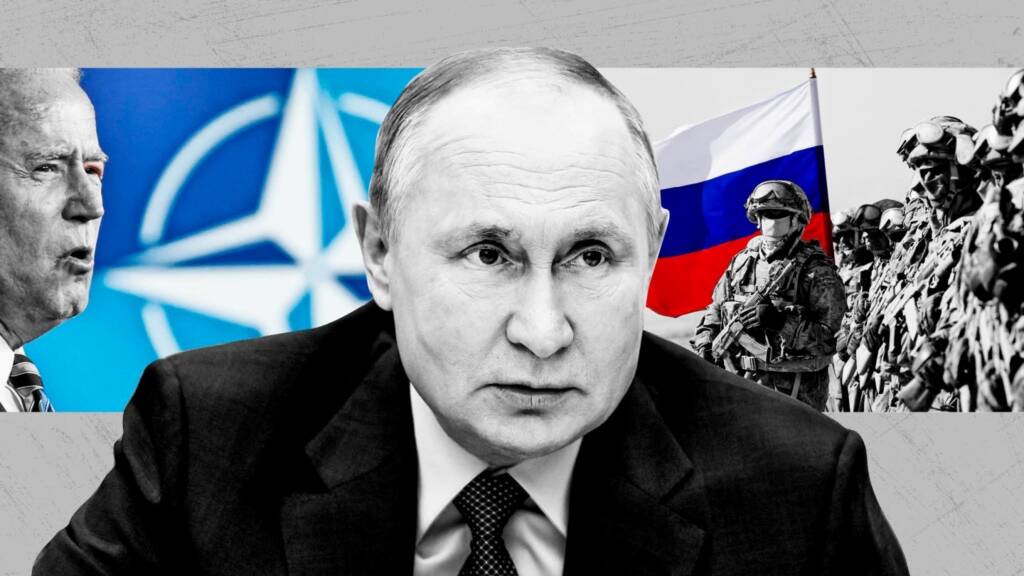In the days of yore, kings would demand for heads of their foes in order to stop punishing the enemy kingdom. In modern times, asking for heads has been replaced by other gifts. And
Putin got such a big gift from NATO.
Imagine a possible but for the sake of understanding, a hypothetical scenario of a back-channel peace process between NATO and Russia. It is a blend of caution, strategic positioning, and nuanced demands from both sides. This situation, rich with diplomatic subtleties, reflects the balance of power, national interests, and the pursuit of dominance on the global stage.
The Russian delegation, in such a scenario, approaches the table with a demeanor that is both alert and cautious, yet underscored by a confident air. Their posture suggests a readiness to secure their interests, buoyed by a sense of strategic advantage. The list of demands they bring to the negotiations is comprehensive, aiming to reshape the geopolitical landscape to their favor. These demands likely include the cessation of all NATO hostilities, a complete withdrawal of NATO forces from Ukraine, and an absolute halt to any discussions of Ukraine joining NATO. Furthermore, Russia would insist on no further discourse regarding Crimea, asserting its stance on the region and Eastern Ukraine, which now it considers part of its territory. The proposition that the position of forces at the ceasefire should dictate new borders encapsulates their strategic objectives, aiming to solidify their gains.
Join us on Telegram: https://t.me/tfiglobal
On the other side of the table, NATO representatives exhibit a mix of alertness and caution, tinged with a palpable sense of concern and disappointment over the trajectory and outcomes of the conflict. The narrowing down of their list of demands, to the point where the primary, perhaps only, feasible demand is for Russia to withdraw from Ukraine without further territorial acquisitions.
But Russia would have a very special demand among the broad strokes of these primary demands- the call for the dismissal of a specific individual, Victoria Nuland. For Russia, Nuland’s EXIT is a necessary condition for no other official as synonymous with the Ukraine disaster as Nuland herself. Nuland’s involvement with Russia isn’t just surface level; it’s deep-rooted, dating back to her hands-on meddling during the 2014 political upheaval, through to her steering the State Department’s dubious role amidst ongoing conflicts.
Read More: As NATO focused on Ukraine, Russia took back Western Balkans
This may be a hypothetical scenario but make no mistake, Nuland’s head is NATO’s first surrender gift. Victoria Nuland wasn’t just a key figure in the Biden administration but America’s anti-Russia face. And firing Nuland to appease Putin wasn’t an easy decision as she was number 3 in the State Department.
The idea of dismissing such a pivotal figure raises several intriguing considerations. Firstly, with the proximity to the U.S. presidential election, any major shifts in the administration’s personnel could have profound implications, potentially altering the course of diplomatic relations and influencing public perception. This timing suggests that a decision of this magnitude would not be taken lightly.
Moreover, the notion of firing Nuland as a means to turn the page on the Ukraine conflict and dump it among past foreign policy catastrophes highlights the weight of symbolic action on the part of the United States.
Read More: As Russia flattens Ukraine, NATO undergoes CIVIL WAR
The dismissal of Victoria Nuland should be perceived as a significant gesture, signaling a pivotal shift in the United States’ stance regarding the conflict with Russia. This move can only be interpreted as the U.S. and by extension, NATO trying to appease Russia owing to Russia’s formidable show of strength. Nuland’s departure could imply a readiness by the U.S. to seek a resolution, potentially indicating that peace negotiations might be closer than previously anticipated. Furthermore, this action could be seen as an acknowledgment of the scale of Russia’s influence and achievements in this conflict, marking it as a momentous victory for Russia in the first significant European conflict since World War II. Such a development suggests a recalibration of strategies and priorities, highlighting the complex dynamics of international diplomacy and the search for peace in challenging times.
Now that Nuland is a history. And soon Biden will be too. And the new Ringmaster in America is setting some really tough guidelines for the NATO circus.
